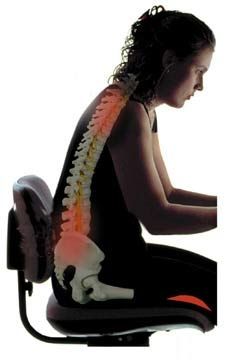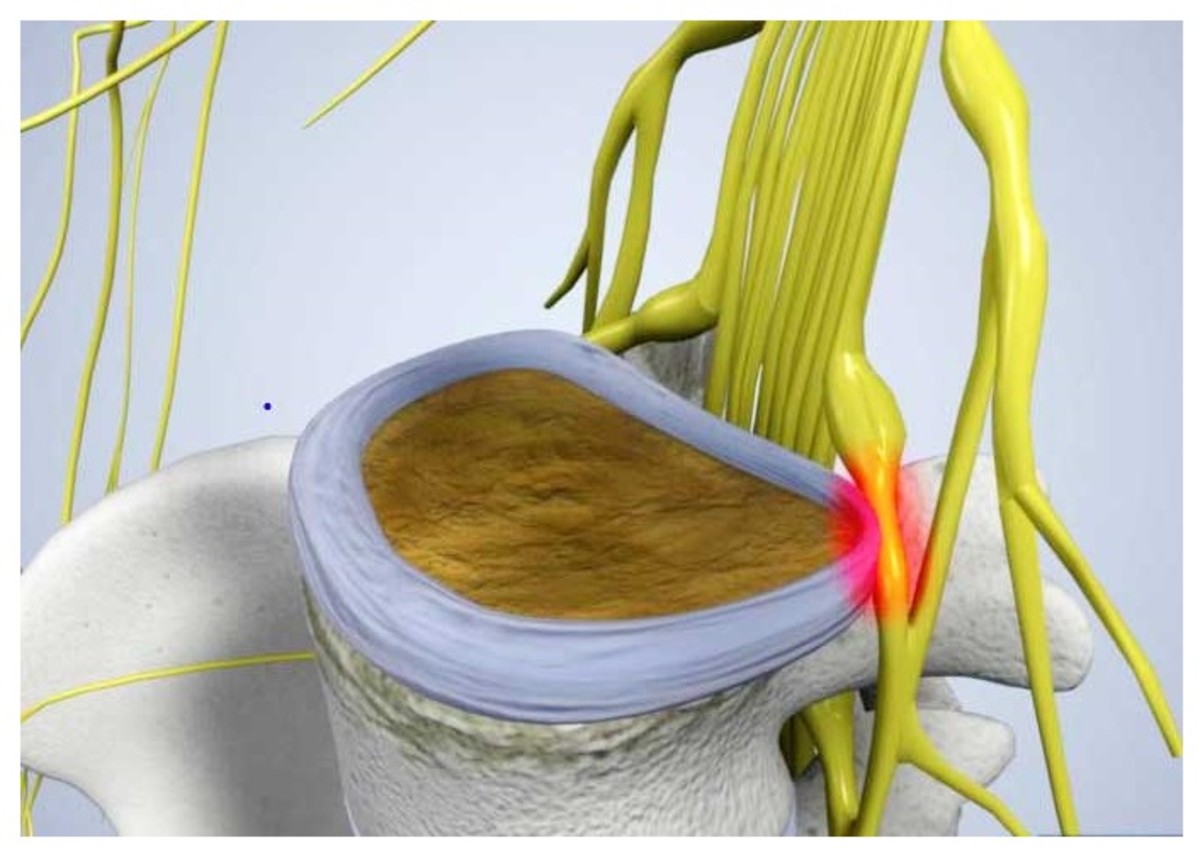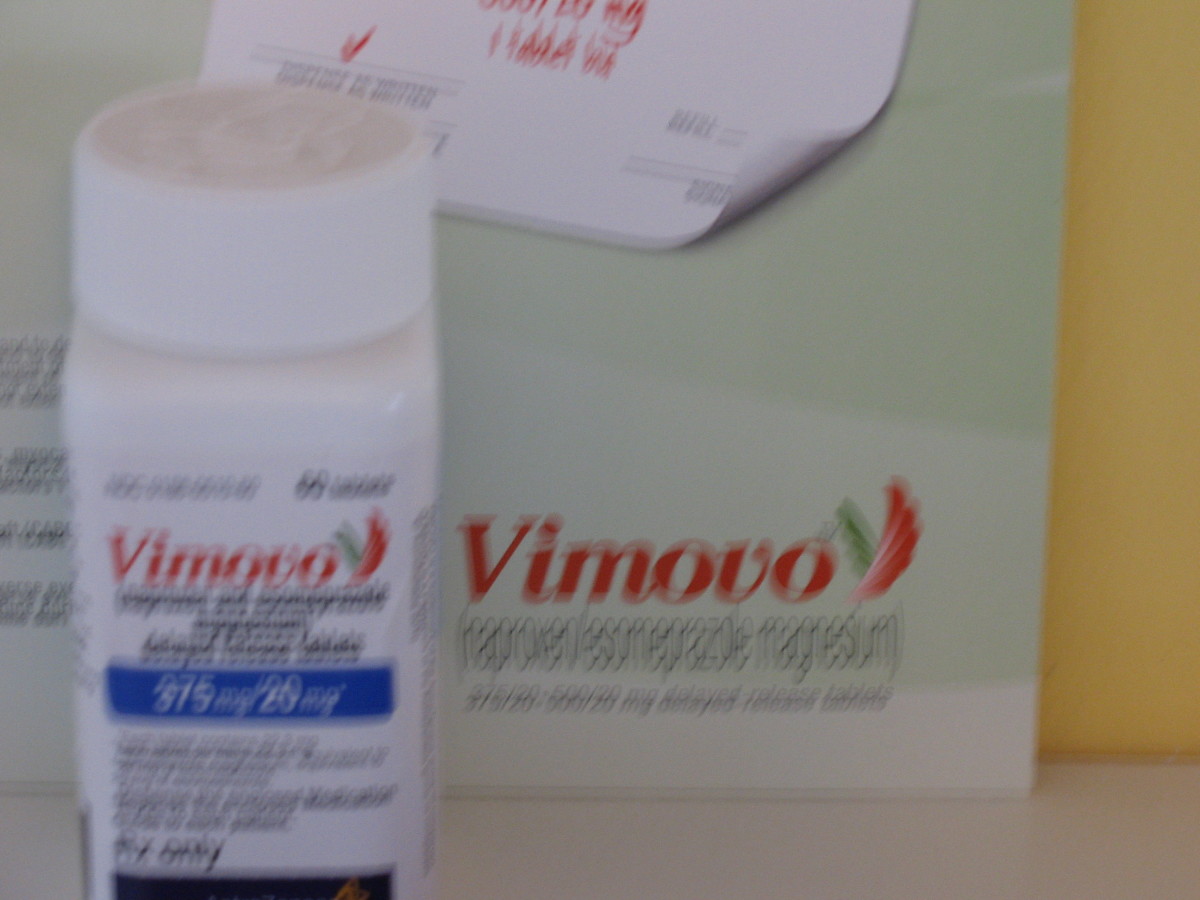Pinched Nerve Treatment – Neck and Back Pain

How To Diagnose, Treat, And Prevent Pinched Nerves
Are you suffering from a pinched nerve in your neck or back ? Welcome to the club - it's a fairly common problem! The good news is that there are lots of established ways to treat it - and this Squidoo lens will discuss all of them.
But what IS a pinched nerve? It's basically a nerve in the body that's fallen under too much compressive pressure, hence the term "pinched." The extra pressure can come from surrounding tissue, such as bones and cartilage.
Pinched nerves can occur at various spots of the body, but most people experience them in the spine. A medical condition known as a "herniated disc" is most often the culprit. The pinched nerve results in a sharp or tingling pain around the affected disc, and the pain can travel down the back of one leg - a condition known as "sciatica."
The most drastic type of treatment for pinched nerve involves surgery, but there are also more conservative treatments available. And when undertaken correctly and early, they can be very effective in treating a pinched nerve.

Signs Of Pinched Nerve in Back
How Do You Know It's Really A Pinched Nerve?
Pinched nerve is generally characterized by one of two things: (1) Pain, or (2) decreased sensation around the pinched nerve. When a pinched nerve causes pain, the pain tends to shoot up and down from the affected area, and can at times be felt up the neck and down the leg.
Decreased sensation, on the other hand, is often accompanied by the "pins and needles" sensation. This tingling sensation, known in the medical world as "paresthesia," can last for long periods of time and can get in the way of work. If you know how it feels when your arm or leg "falls asleep," then you know what paresthesia feels like. And when it happens often, it may be a sign of a pinched nerve.
A pinched nerve in the lower back starts with back pain and stiffness. The next symptoms are numbness or weakness of your legs.
The mildest cases of pinched nerve can often be remedied with lots of bed rest and over-the-counter pain medication. But when your condition fails to improve even after several days of home treatment, it's a sign to see your doctor. Your pinched nerve might be serious, and might be getting worse - and as such, medical intervention becomes necessary.

Signs Of Pinched Nerve in Neck
So you wake up with neck pain? If you have pinched nerve in the neck, pain is usually the first sign you will experience. The next sign is mild weakness or numbness in your arms and tingling in hands.
A pinched nerve in the neck can affect your arms and all the down to the fingers, mainly the pink finger. The pinched nerve sensation feels like your body part has "fallen asleep."
1. neck pain
2. stiffness of neck muscles
3. tingling in fingers
4. numbness in arms
Just a reminder that every person will experience a slightly different symptoms.
The intensity of the numbness and location of your body part will vary. Want to know more about preventing neck and back pain? Read this article here

Pinched Nerve Treatment For Neck
Is There A Pain Free Solution Available?
No one likes to experience any neck pain, particularly cervical pain that interrupts with your daily life. The worst thing is not getting informed on how to correctly treat your injury. This could prolong and also worsen the injured neck.
So what is the most effective treatment for a pinched nerve in the neck? Here are several compressed nerve remedy tips, which can help you enjoy a pain free solution to your neck problems.
How To Approach Pinch Nerve Neck Pain Quickly?
First visit a physiotherapist who'll diagnose your problem carefully and advise you to use neck traction product. By using neck traction therapy it will softly stretch the neck out in a 20 to 40 degree angle.
This releases all the strain being placed on the compressed nerve creating a pressure free environment. Neck traction is normally repeated a few times while you lay down on a bed and the physiotherapist or chiropractor performs the gently spine adjustment.
Neck Traction therapy lets the pain diminish gradually; providing some relief back to your neck area.
Drug Free Remedy for Pinched Nerves
if you are not feeling comfortable to visit a Chiropractor your can buy a portable neck traction device. This can be used in your own home and can gives you the similar benefits a medical professional can.
A good air neck traction device should fits like a brace and allows you to pump air to produce a support platform round your neck. Employing a gentle pull up-wards it brings about exactly the same effect as the neck traction activity.
How Neck Traction Helps Pinched Nerve - It's Safe and Effective
Additional Methods of Coping with Compressed Nerve Pain
- Neck Brace
If you don't use any neck traction physical exercises it's crucial to ensure that you use a neck brace. A neck brace will limit the mobility of your head preventing you from harming yourself generating a lot more pain rather than pain relief.
When you use a neck brace it is often advised to start by carrying out a few regular workouts on the neck area. By using the gym or simply regular exercising at home can help you develop good neck strength.
Ask your physiotherapist to teach you specific exercises to strengthen certain neck muscles.
- Medications, if you still insist
This is not recommended, but if you still need pain medication ask your medical professional for advice. Having the right relief medication will help you feel a lot better, but it only relieves the symptoms temporarily.
Ask for the right pain medicine that's appropriate for your pain levels.
There are numerous medicines, which will help to loosen up the muscle tissues as well as lowering pain all in one simple dosage.
The most commonly prescribed by doctors is Ibuprofen. It's used for minor pain in your neck.
- Heat Therapy
Finally, make use of the miracle of heat treatments. You will can find shoulder heating pad that perfectly fist around your neck, giving you soothing muscle relief.
Shoulder heating pad comes with infrared heat offering you a comfortable heat treatment, relieving stress tension on neck muscle tissue.
ChiSoft Neck Traction


What Causes Pinched Nerve?
The Many Different Causes Of The Pain We All Know And Hate
As explained earlier, pinched nerves are caused by too much compression pressure on a nerve. One of the most common kinds of pinched nerve conditions happens to be a herniated disc in the spine, where the vertebra are pressed too close together, pushing the disc out of place and placing unnecessary pressure on the nerve.
The offending pressure is brought about by many things. A common cause is injury, such as one suffered through sports or a bad fall. Also, repetitive stress (continuous heavy lifting or bending over) can also cause injury that results in a pinched nerve.
But many times, pinched nerves are simply caused by years of poor posture. Decades of not getting enough exercise, or simply sitting for most of the day, can compress the spine over time, until the compression reaches the point that it pinches one or more of the nerves in the spine.
And finally, obesity is a growing cause of pinched nerves. All that excess weight puts a lot of unnecessary pressure on the spine, which in turn can cause discs to rupture or slip out of place.
Other causes include osteoarthritis and other conditions that cause the bones to thicken. Vertebra can develop bone spurs that compress discs and pinch nerves.

Other Causes Of Pinched Nerve
How Even Healthy People Can Suffer Pinched Nerves
In some cases, pregnant women can suffer pinched nerves owing to the extra weight and water they put on. Sufferers of rheumatoid arthritis are also at risk, as the inflammation between the bones can cause swelling, which in turn compresses nerves.
But no matter what the cause of the pinched nerve is, it's a well-known fact that if it's left alone for a long time, it can result in permanent, irreversible damage. If days pass with no improvement, or if your condition worsens, see your doctor immediately.

At The Doctor's Office
What To Expect During Your Appointment
Your doctor will likely give you a thorough examination, and will ask you what your symptoms are – where and when you started experiencing them, how long you've been in pain, and what you think might have caused the problem. Be sure to answer your doctor's questions as honestly and completely as you can.
Your doctor will also likely ask you about your job, your hobbies, your activities, and whether your pain may have been brought about by an injury. And finally, your doctor may also refer you to certain specialists or ask you to undergo certain tests. Your doctor's goal is to correctly diagnose your condition as indeed being a pinched nerve. This is important, because different conditions need different treatments.
Give your doctor the list of medications you're currently taking, and ask him as many questions as you need (you might need to write them all down!). And finally, it helps to bring a friend or relative with you to the doctor's office, both to help you if walking is difficult AND to make sure you don't miss anything the doctor says to you.

Conservative Treatments For Pinched Nerve
How To Treat Your Pinched Nerve Condition At Home
First of all, bed rest is very important when you first suspect a pinched nerve. Stop doing any activities that involve flexing or bending the affected area. These include sports, heavy lifting, long-distance traveling, and other strenuous activities.
Your doctor will also most likely prescribe medication, physical therapy, or traction therapy, or a combination thereof. Medication often takes the form of over-the-counter analgesics and muscle relaxants - if your doctor thinks your condition to be more serious, they may prescribe stronger prescription drugs.
In some more serious cases of pinched nerve, doctors may prescribe periodical corticosteroid injections. These injections are made at the affected areas, and are quite effective in reducing or relieving the pain for several days or weeks at a time.
Physical therapy is a treatment method that involves stretching and strengthening the area around the pinched nerve. Your physical therapist will design a special exercise regimen that's meant to relieve the pressure on your pinched nerve little by little everyday.
Strengthening your back muscles, for instance, will take some of the load off the pinched nerve, and help hold your spine up. Many cases of pinched nerves are remedied with a good medication + physical therapy regimen.

Surgery For Pinched Nerve
When Conservative Treatments Don't Work
If there is still no improvement in your condition after several weeks or months of conservative treatment, then surgery may be required. You'll need to go under the knife to properly remove the pressure from your nerve.
The seriousness of surgery will vary. Some are minor, requiring only a small incision to make adjustments on the offending disc or remove an offending piece of bone. Other surgeries are more major, requiring the removal of an entire vertebra to relieve the pressure.
Either way, it's important to get X-rays and/or an MRI of your pinched nerve as early as you can. That way your doctors can decide whether surgery is needed immediately.

How To Prevent Pinched Nerve
Your First Line Of Defense Against Pinched Nerve
As mentioned earlier in this Squidoo lens, one of the biggest causes of pinched nerves is a lifetime of poor posture. That means to minimize (if not eliminate) the risk of pinched nerve in the future, you'll have to practice proper posture as early as possible. And this is especially true for lifting.
When lifting anything heavy from the ground, keep your back as straight and as vertical as it can be. Bend your knees, bring the load close to your body, and lift with your legs - NOT your back. This takes some practice, but it's nothing compared to the pain you'll suffer as a pinched nerve victim.
What's more, when working at a desk or at your computer, don't slouch forward or lean too far back. Sit easily, like a true professional, with your back straight and your head directly above your neck. If investing in a footrest or new keyboard will help you keep your back straight, then go right ahead.
When standing and walking, it also helps to keep your chin up and shoulders back. Not only does it keep your spine straight, but it also makes you look and feel more confident.
And finally, it helps to avoid obesity in its entirety. No matter how hard it is, get into the habit of getting enough exercise each day. And I'm not talking about just spending a half-hour on the treadmill - you need to add strength and flexibility training as well. Jogging alone can cause repetitive stress injury, so mix it up!





